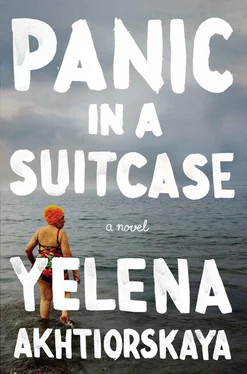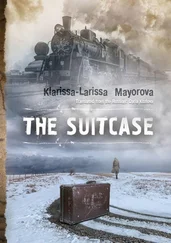She said she had plans.
• • •
FRIDA HADN’T LIED — she had plans. She went to her parents’ bedroom and rummaged in her mother’s makeup case as if in a decorative bowl of rocks. This failed — her bones didn’t tingle. She applied lipstick the color of Chinese eggplant and thought about where she could go, then called Gabe, who did a round of verbal cartwheels before admitting he was scouring the internet for men — tonight potential, not life potential, he said, though either would work and the end result would be a new pair of sneakers. I stayed out late yesterday and feel sick, he said. That’s fine, said Frida, who anyway didn’t feel up to dealing with the train. She turned on the TV and traveled through channels, not letting her thumb rest even if the colors or poses intrigued. She usually guessed wrong as to what interested her. She made her bed, neatly tucking the corners, then got into it, then left it but didn’t bother to make it again, knowing that the urge to get in would only strike once it was made. She wasn’t hungry, which was tragic.
Marina’s perfume and Levik’s cologne lingered in the corridor until the downstairs neighbors began their supper preparations. What the Hedonovs ate nightly was a mystery, but a consistent one. Even Robert with his dulled olfactory sense timed his boardwalk outings to their hour of dining. The Hedonovs were always jumping and shouting. They took naps in shifts, on the principle that it was easier to join in the revelry than start anew. Devotion to merriment on such a scale meant only one thing: They jumped not only for the thrill of jumping but to keep something terrifying, so terrifying it couldn’t be acknowledged, at bay. Of course, after so much bouncing, one couldn’t rule out brain damage. As to how many of them there were, it was hard to keep track. The pillars could be counted — the patriarch, Uzh; his two spinster sisters, Bo and El; the matriarch, Klysma; and her deranged brother, Grad — but Klysma’s children accrued imperceptibly, blink and there were two more, and relatives in need of convalescence were always arriving for two-week stays — they considered the sea air therapeutic, and America generally lacked for sanatoria.
Before the Hedonovs a man lived there, a Refrigeration Institute friend of Levik’s (they’d bonded because their fathers were big-shot factory bosses and huge assholes, Marina had explained). The apartment had witnessed his downfall, as had Frida, whose bedroom was directly above his in a building with no sound insulation. He’d done his best with the place — wallpaper stripped, walls partially gutted, floorboards dug out, doors torn from hinges, ceiling destroyed by water damage. After he’d been taken away (mental institution? prison?), the apartment stood empty for many months. At first it was a shock, a collective shame, a disgrace; residents tried to make use of the building’s other wing. Then, simply by not relenting, by remaining destroyed and abandoned, the apartment began the transformation into abstraction, becoming a symbol of something. For a moment it was the building’s core, establishing a grid of intimacy around itself. Then the Hedonovs bought the place. It was almost a move against nature, a tempting of fate. Renovation took a year and was rather an exorcism.
But why was Frida still thinking about that man, who’d owned a shriveled-olive Chihuahua with such pure fear in its eyes that, stranded in the elevator with it, Frida would become afraid of herself, as if some force in her might awaken and make her do horrible things to that dog? It hid behind the metal cart without which the man never left home. Of that trio — the man, the cart, and the Chihuahua — only the cart’s fate was known. The blue-haired old lady who tended the lobby plants had claimed it for herself, insisting she’d been its rightful owner all along. Four years had already passed, and yet the day of his disappearance grew no less vivid. Frida had been staring at the large swirling snowflakes in her organic chemistry textbook when her mother barged in, screaming, The downstairs apartment is empty, Pasha’s gone!
That was it! His name had fallen through the cracks, perhaps not unintentionally. And now it was a simple mistake, confusing the two Pashas. Trying to break through to the surface was the other Pasha, her uncle, but instead she’d slipped out of habit on her old downstairs neighbor. Freud would’ve been pleased.
But what about her uncle? She had so little to go on, practically nothing of any substance, and yet he loomed so large over the household. He was a mythic creature, a legend. It was impossible to imagine him as the father at a wedding. Dancing? Rejoicing? He slipped out of all the scenarios her mind conjured up for him. Sitting in a dentist’s chair, ordering from a menu, stretching a hamstring, filing taxes, trailing a tour guide — not Pasha. Her uncle didn’t tie shoelaces or own a cell phone. There was no laundry in his life, though a checkered, yellowed ironing board leaned against the wall behind his desk. The legs of the desk were as crooked as those of his landlady, who had three white hairs sprouting from her chin and at midnight hovered over the charcoal-smudged city astride her broomstick.
Entire seasons refused to contain Pasha. Surrounded by icicles, heaps of snow, and grime, sure, but not sunbathers or trees in bloom. Frida was always hearing about terrible snowstorms, Pasha unable to leave his house for weeks, classes at the university canceled, heating broken, tram tracks iced over. In nostalgia tales of the fair Odessa spring, Pasha didn’t figure. Her uncle was stuck in February, unable to fix the radiator because no tool made sense in his large white hands. He could prod some handles, jiggle screws, but the result was that the heating shut off altogether and he huddled beneath five blankets watching his breath while everyone else frolicked seaside or wandered under the birches that had a frail, purebred quality. Pasha awoke with his beard frozen to the wooden boards, bedbugs in the fissures, windows clouded with frost. God forbid he should smile under a clear blue sky. In old photos Frida’s family made Odessa look like a resort town. There are cliffs, roaring waters, rustic picnic tables on rough terrain, tomatoes spilling out of their skins, thick sausages, young cheeses, dark bread. Tan faces. White teeth. Men, small to medium in stature, prematurely saggy but with shapely calves, stand around in tiny swimming trunks. Women tower over them. Breasts, breasts everywhere. No telling where body ends and bosom begins. Esther abounds — here she’s bending over a table (is she going for the last circle of kielbasa on the plate or to tug a tempting braid — Marina’s, perhaps — cut off by the frame?), and there she poses on a boat, hair slapped against her cheek, squinty satisfaction, an ample arm slung over the railing. Marina runs around in white underwear long past an acceptable age.
Pasha chooses not to leave the snow. He wears fur caps with the earflaps pinned, exposing a catastrophic excess of cartilage. Skin strains over nose and ears. His overcoats are as severe as his facial expressions. The sky is low, almost as dark as the shadows under his eyes. The gravity of the Soviet situation is on display, Stalin’s legacy palpable in the photos Pasha populates. The Nasmertovs through their documentation constructed an Eden from which they could be evicted. Pasha did no such thing, almost as if he knew he wouldn’t need it. Or was this mere hindsight? Perhaps it was Frida’s faulty memory. It was years since she’d gone through that box of old photos.
The jumping abated. Frida put her ear to the floor. Uzh liked to plant his seed into Klysma nightly. During this ritual Klysma wailed and pleaded with God, for material possessions or help with their financial situation, which really was in need of divine intervention. It appeared to be a slow night, when it would take forever. Frida could go get a sandwich and easily make it back in time.
Читать дальше












